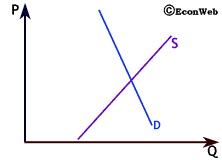

Copyright © 1995-2004 OnLineTexts.com, Inc. - All Rights Reserved
 In the case of relatively inelastic demand, shown to the right, the imposition of a $4.00 excise tax causes the market price to increase to $7.25, a $2.75 increase over the pre-tax equilibrium price of $4.50. Sellers bear much less of the burden of the tax in this market. They receive revenue of $3.25 per unit, only $1.25 less than the pre-tax price.
In the case of relatively inelastic demand, shown to the right, the imposition of a $4.00 excise tax causes the market price to increase to $7.25, a $2.75 increase over the pre-tax equilibrium price of $4.50. Sellers bear much less of the burden of the tax in this market. They receive revenue of $3.25 per unit, only $1.25 less than the pre-tax price.
Inelastic demand means that there are few substitutes for this good. The tax causes market price to rise by more and quantity demanded to fall by less, for a good with a relatively inelastic demand. In other words, because they have few alternatives to purchasing this product (inelastic demand), consumers bear more of the burden of the tax.


Copyright © 1995-2004 OnLineTexts.com, Inc. - All Rights Reserved